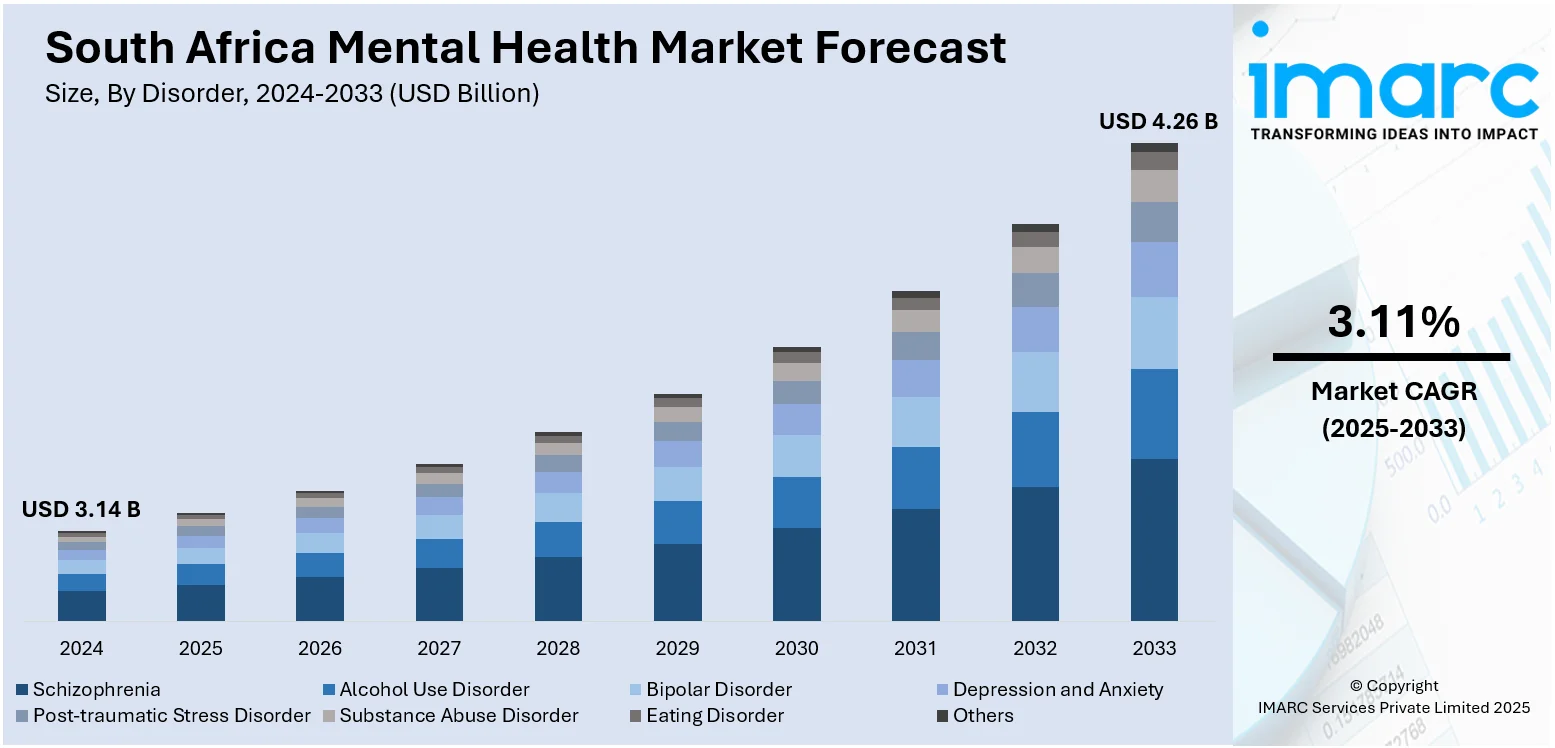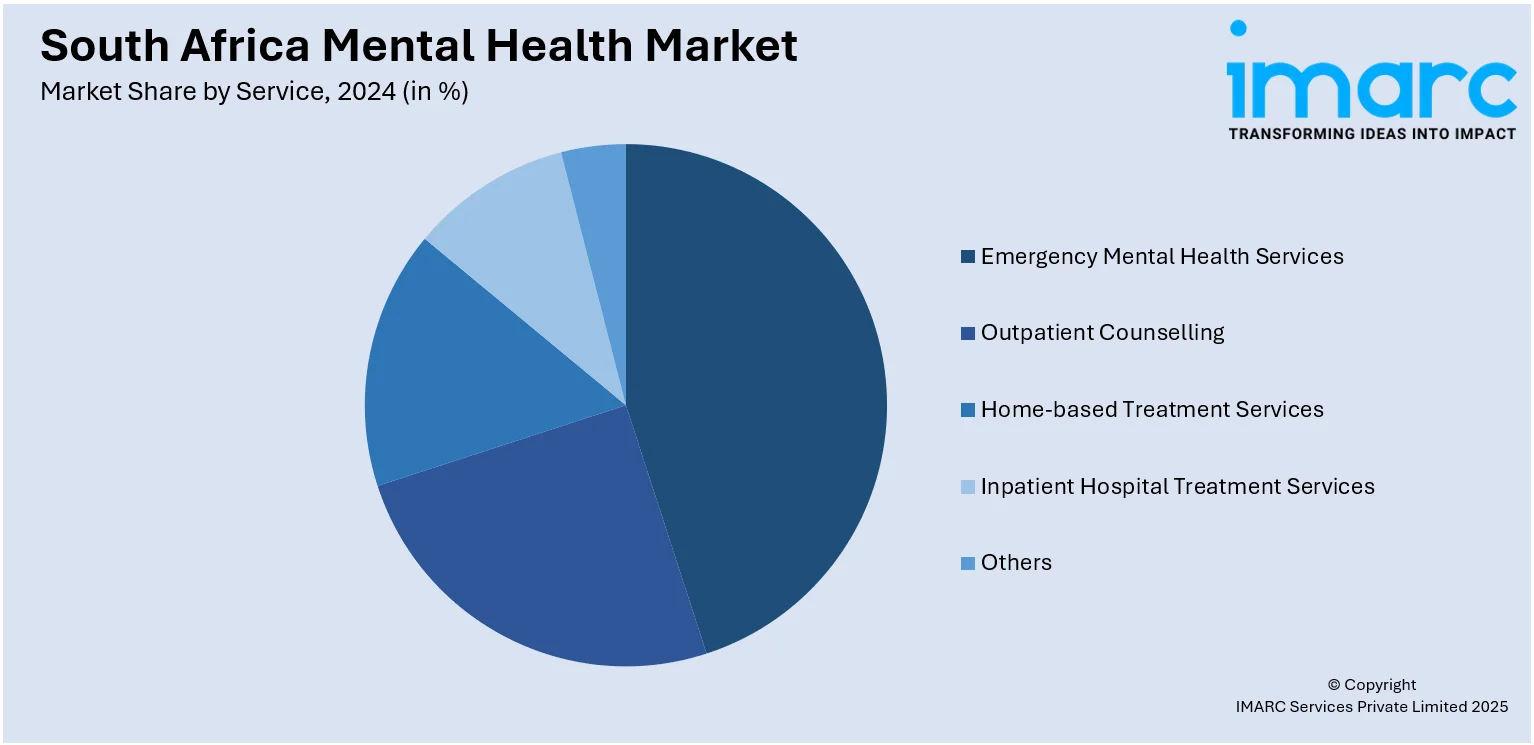
South Africa Mental Health Market Size, Share, Trends and Forecast by Disorder, Service, Age Group, and Region, 2025-2033
South Africa Mental Health Market Overview:
The South Africa mental health market size reached USD 3.14 Billion in 2024. The market is projected to reach USD 4.26 Billion by 2033, exhibiting a growth rate (CAGR) of 3.11% during 2025-2033. The market is fueled by growing mental health awareness, heightened government efforts, and the incorporation of mental wellness into mainstream healthcare services. In addition, the increasing burden of depression, anxiety disorders, and substance abuse disorders in the region is driving higher demand for affordable and accessible mental health services. Moreover, the increased engagement of non-governmental health agencies and digital health platforms is improving outreach, early intervention, and ongoing care, thus augmenting the South Africa market share.
|
Report Attribute
|
Key Statistics
|
|---|---|
|
Base Year
|
2024 |
|
Forecast Years
|
2025-2033
|
|
Historical Years
|
2019-2024
|
| Market Size in 2024 | USD 3.14 Billion |
| Market Forecast in 2033 | USD 4.26 Billion |
| Market Growth Rate 2025-2033 | 3.11% |
South Africa Mental Health Market Trends:
Rising Demand for Digital Mental Health and Teletherapy Solutions
Increasing demand for affordable mental health services in South Africa is leading to the adoption of digital and remote care solutions. Due to the limited number of mental health experts, especially in rural and disadvantaged regions, mobile apps, online counseling sites, and teletherapy services are filling major care gaps. These solutions bring scalable, affordable methods of providing assistance, particularly to people who are struggling with anxiety, depression, and substance abuse. According to industry reports, as of early 2024, South Africa boasts 45.34 million internet users, representing a penetration rate of 74.7%. The increased penetration is significantly facilitated since smartphones enable people to gain access to digital services even in remote areas. Such accessibility is particularly pertinent in the mental health arena, where virtual platforms are emerging as a viable means of providing support. As awareness of mental well-being increases and access to in-person treatment is limited in many places, digital resources are bridging the chasm and making access to mental health services more widespread nationally. Additionally, private providers and mental health startups are experimenting with subscription-based models to provide ongoing care. The increasing social acceptability of online therapy and the preference for convenience and privacy are also propelling the trend.

To get more information on this market, Request Sample
Integration of Mental Health into Public Health, Education, and Workplace Systems
There is a significant trend towards incorporating mental health services into public health systems, schools, and corporate systems in South Africa. Public sector reforms are also focusing more on the integration of psychological testing and early intervention within primary healthcare settings, advocating for comprehensive care. Within schools, mental health education and peer-support programs are also taking center stage, with courses on emotional resilience and stress management being introduced at different levels of education. Such interventions play a pivotal role in understanding the increasing prevalence of youth depression, self-harm, and behavioral problems. Within the corporate world, businesses are investing in employee aid programs that provide confidential counseling, stress-reduction seminars, and burnout prevention techniques. This is also helping to destigmatize mental illness as institutions normalize psychological support as a routine and essential component of all-rounded development and organizational health. This, in turn, is driving South Africa mental health market growth.
Emphasis on Community-Based and Culturally Informed Care Models
The market is increasingly shaped by a culturally sensitive, community-oriented approach that reflects the country's socio-cultural diversity. Community health workers, lay counselors and support groups are key to providing mental health education and core psychosocial support, especially in low-resource areas. Decentralized care in this model facilitates the early detection of mental health problems and localized interventions that are practical and relevant to the local context. In addition, there is increasing focus on culturally responsive practice that integrates indigenous worldviews, languages, and healing practices so that mental health care is sensitively tuned to the lived realities of diverse populations. Attempts to train providers in cultural competence and to work with local leaders and traditional healers are narrowing the gap between formal health care and community trust. This movement also mirrors a larger trend toward patient-centered care, in which respect for social values, community healing, and historical understanding are central to the design of effective mental health treatments in South Africa.
South Africa Mental Health Market Segmentation:
IMARC Group provides an analysis of the key trends in each segment of the market, along with forecasts at the country and regional levels 2025-2033. Our report has categorized the market based on disorder, service, and age group.
Disorder Insights:
- Schizophrenia
- Alcohol Use Disorder
- Bipolar Disorder
- Depression and Anxiety
- Post-traumatic Stress Disorder
- Substance Abuse Disorder
- Eating Disorder
- Others
The report has provided a detailed breakup and analysis of the market based on the disorder. This includes schizophrenia, alcohol use disorder, bipolar disorder, depression and anxiety, post-traumatic stress disorder, substance abuse disorder, eating disorder, and others.
Service Insights:

- Emergency Mental Health Services
- Outpatient Counselling
- Home-based Treatment Services
- Inpatient Hospital Treatment Services
- Others
A detailed breakup and analysis of the market based on the service have also been provided in the report. This includes emergency mental health services, outpatient counselling, home-based treatment services, inpatient hospital treatment services, and others.
Age Group Insights:
- Pediatric
- Adult
- Geriatric
The report has provided a detailed breakup and analysis of the market based on the age group. This includes pediatric, adult, and geriatric.
Province Insights:
- Gauteng
- KwaZulu-Natal
- Western Cape
- Mpumalanga
- Eastern Cape
- Others
The report has also provided a comprehensive analysis of all the major regional markets, which include Gauteng, KwaZulu-Natal, Western Cape, Mpumalanga, Eastern Cape, and others.
Competitive Landscape:
The market research report has also provided a comprehensive analysis of the competitive landscape. Competitive analysis such as market structure, key player positioning, top winning strategies, competitive dashboard, and company evaluation quadrant has been covered in the report. Also, detailed profiles of all major companies have been provided.
South Africa Mental Health Market Report Coverage:
| Report Features | Details |
|---|---|
| Base Year of the Analysis | 2024 |
| Historical Period | 2019-2024 |
| Forecast Period | 2025-2033 |
| Units | Billion USD |
| Scope of the Report | Exploration of Historical Trends and Market Outlook, Industry Catalysts and Challenges, Segment-Wise Historical and Future Market Assessment:
|
| Disorders Covered | Schizophrenia, Alcohol Use Disorder, Bipolar Disorder, Depression and Anxiety, Post-traumatic Stress Disorder, Substance Abuse Disorder, Eating Disorder, Others |
| Services Covered | Emergency Mental Health Services, Outpatient Counselling, Home-based Treatment Services, Inpatient Hospital Treatment Services, Others |
| Age groups Covered | Pediatric, Adult, Geriatric |
| Provinces Covered | Gauteng, KwaZulu-Natal, Western Cape, Mpumalanga, Eastern Cape, Others |
| Customization Scope | 10% Free Customization |
| Post-Sale Analyst Support | 10-12 Weeks |
| Delivery Format | PDF and Excel through Email (We can also provide the editable version of the report in PPT/Word format on special request) |
Key Questions Answered in This Report:
- How has the South Africa mental health market performed so far and how will it perform in the coming years?
- What is the breakup of the South Africa mental health market on the basis of disorder?
- What is the breakup of the South Africa mental health market on the basis of service?
- What is the breakup of the South Africa mental health market on the basis of age group?
- What is the breakup of the South Africa mental health market on the basis of region?
- What are the various stages in the value chain of the South Africa mental health market?
- What are the key driving factors and challenges in the South Africa mental health market?
- What is the structure of the South Africa mental health market and who are the key players?
- What is the degree of competition in the South Africa mental health market?
Key Benefits for Stakeholders:
- IMARC’s industry report offers a comprehensive quantitative analysis of various market segments, historical and current market trends, market forecasts, and dynamics of the South Africa mental health market from 2019-2033.
- The research report provides the latest information on the market drivers, challenges, and opportunities in the South Africa mental health market.
- Porter's five forces analysis assist stakeholders in assessing the impact of new entrants, competitive rivalry, supplier power, buyer power, and the threat of substitution. It helps stakeholders to analyze the level of competition within the South Africa mental health industry and its attractiveness.
- Competitive landscape allows stakeholders to understand their competitive environment and provides an insight into the current positions of key players in the market.
Need more help?
- Speak to our experienced analysts for insights on the current market scenarios.
- Include additional segments and countries to customize the report as per your requirement.
- Gain an unparalleled competitive advantage in your domain by understanding how to utilize the report and positively impacting your operations and revenue.
- For further assistance, please connect with our analysts.
 Request Customization
Request Customization
 Speak to an Analyst
Speak to an Analyst
 Request Brochure
Request Brochure
 Inquire Before Buying
Inquire Before Buying




.webp)




.webp)












